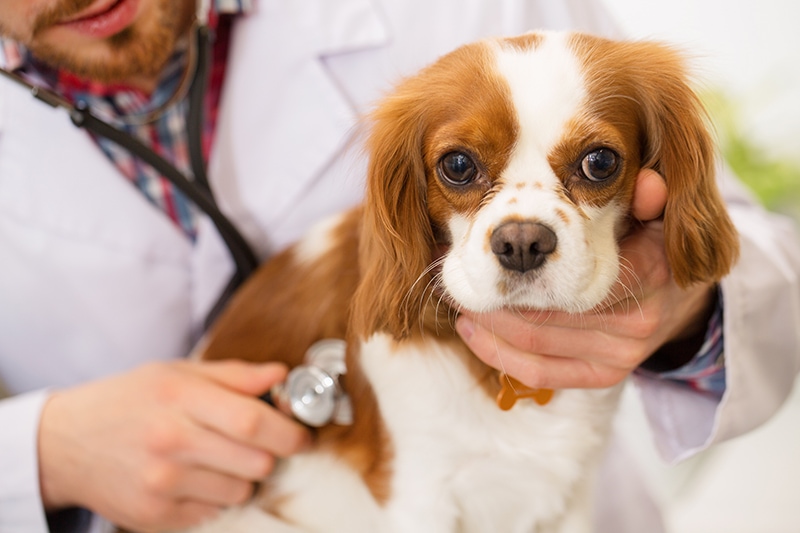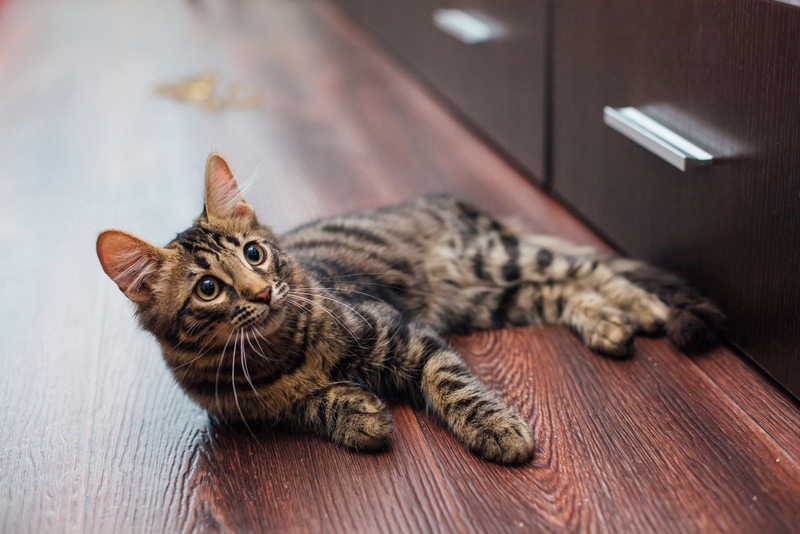Why Isn’t My Puppy Eating? Vet Explained Reasons & What to Do

Updated on
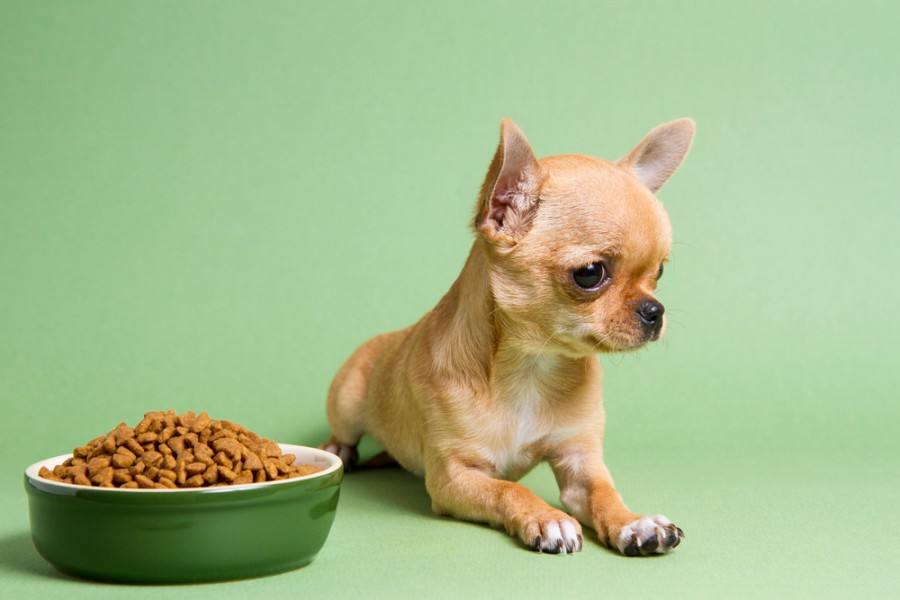
Click to Skip Ahead
When you think about your puppy eating, you might think of a Labrador Retriever eating everything they come across or a Yorkie turning up their nose at that canned pate you just opened.
But what if your puppy is not eating like they used to? Is it normal? Let’s look at some of the reasons that puppies won’t eat and what you can do.
The 7 Reasons Why Puppies Won’t Eat
There are lots of reasons why your puppy might not eat their meal. It takes a little digging to see if you can come up with the reason why. If your puppy constantly doesn’t eat, contact your veterinarian for a consultation and physical exam.
1. Stress
Puppies are going through a lot of changes in their first few months. Most of them go to a new home after they’re about eight weeks old, and your breeder or rescue will wean them about this time. They’ve gone from being surrounded by their siblings to a new place filled with new scents, sounds, and sights. Plus, the food might be different, too!
It’s easy for all these differences to be overwhelming for your pup, who might not want to eat due to the stress of the changes.
If your puppy has bonded closely with you, they might not want to eat without you being present. Some dogs are social eaters and like to eat with their person. Some puppies also suffer from separation anxiety and won’t eat while they pace or even panic.
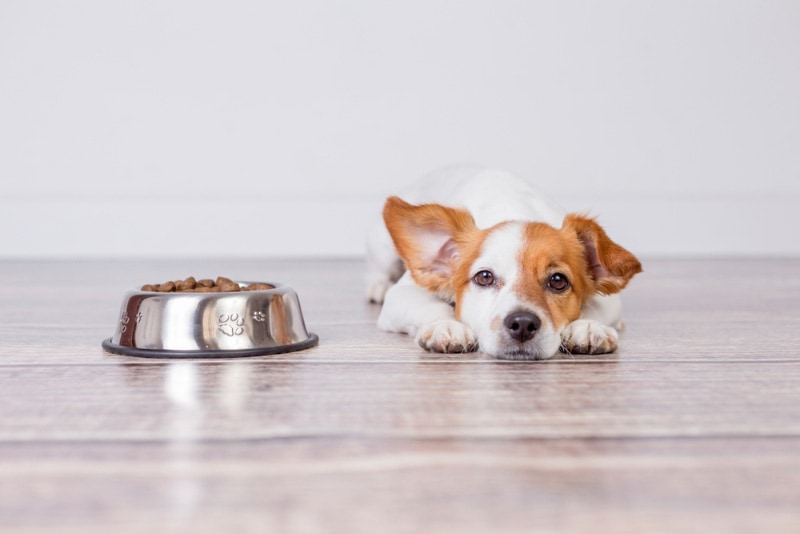
2. Dental Pain
Puppies get their first teeth at around three weeks, which starts the teething process. These deciduous (or baby teeth) begin to fall out when your puppy is about 12 weeks old, and they begin to get adult teeth. This process lasts until they’re about six months old.
Teething can be very uncomfortable for puppies. Between teeth falling out and new ones growing through their gums, it’s little wonder that some puppies are reluctant to eat!
It might be hard to tell that your puppy is teething because they usually swallow their baby teeth that come out. Sometimes, you’ll notice blood on their toys or even a new, bigger tooth where a tiny one once was.
3. Vaccinations and Medications
If you think back to the last time you received a vaccination, you’ll probably remember how tired you were for a bit after getting your vaccine. Your puppy can feel the same way. Sometimes, they’re lethargic for a day or two after getting vaccinated.
Some medications can also make your puppy less likely to want to eat. They might give your pup an upset tummy. Typical examples are antibiotics and anti-inflammatory drugs, which you should give with food to minimize the possibility of causing GI upset.
If your puppy undergoes anesthesia for a procedure like a spay or neuter, they might not want to eat. The medications can make your pet tired or nauseous, so be prepared for that after they get fixed.
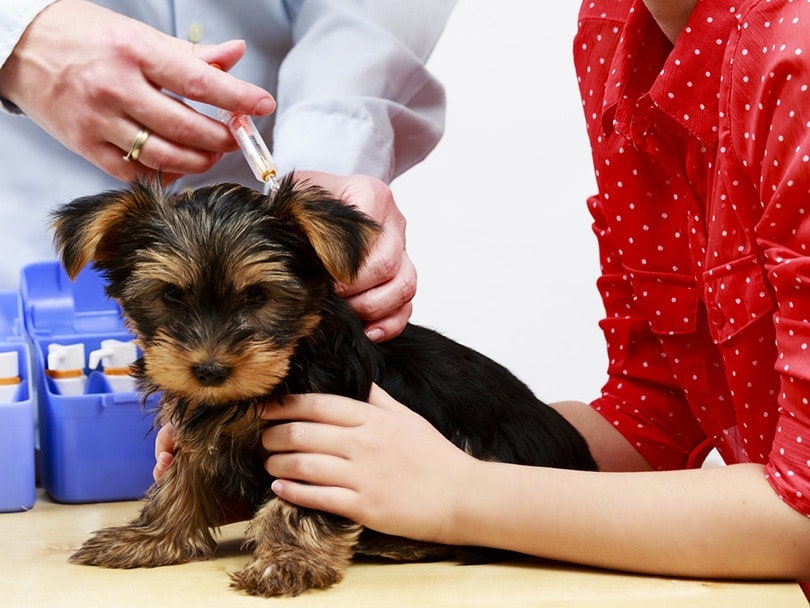
4. Picky Eaters
Sometimes, you’ll have a puppy that’s a pretty picky eater. Maybe you’ve offered them some tasty human food, like a piece of chicken. They might also not like the taste of their food. Some dog breeds are pickier eaters than others. For example, Huskies appear quite finicky for many pet parents.
5. Distractions
It’s easy to distract your puppy. Maybe you’re playing fetch in the backyard, or your puppy is busy chasing your older dog around the house. With lots going on around them, some puppies will hold off from eating.
Your puppy might also be tired. If they have played hard for a few hours, your pup might be inclined to nap before investigating their food bowl.
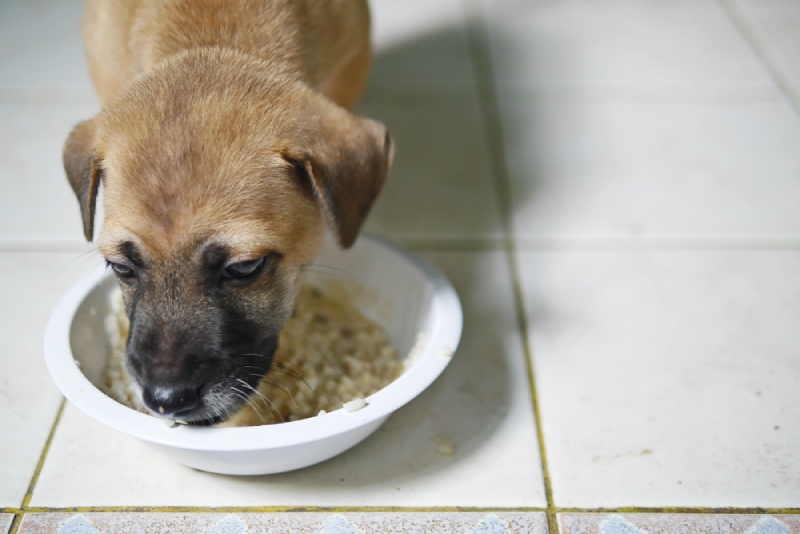
6. Too Much Food
It might be hard to believe, but you can offer your puppy too much food. While some puppies will eat and eat, some will self-regulate how much they’re consuming.
A common culprit in overfeeding your puppy is the treats you give for housebreaking and learning basic commands. Consider using toys as rewards or offering some of your dog’s meal allotment as treats so they’re not getting excessive calories. As much as 59.3% of dogs worldwide are overweight, so not giving as much food can help keep your pet at an ideal weight.
7. Illnesses
Unfortunately, puppies are prone to various illnesses because they’re not fully vaccinated, and their immune system is not fully competent. One of the most severe viral infections that can affect puppies is parvo. This virus affects rapidly dividing cells, especially those in the gastrointestinal tract and bone marrow.
Puppies can easily get intestinal parasites from the environment, as well as other dogs. Roundworms and hookworms are common and tend to cause vomiting and diarrhea, making your puppy less interested in food.
Puppies explore the world with their mouths, chewing on so many things. Your puppy could eat something they’re not supposed to and hurt their mouth, leading to them not wanting to eat. Some puppies will eat non-digestible items and get an intestinal obstruction, which can cause them not to eat.
Upper respiratory infections are common, particularly amongst puppies from high-population areas like pet stores and shelters. If your dog can’t smell from their respiratory infection, they may not want to eat.

Should You Worry if Your Puppy Doesn’t Eat?
If it’s a one-time occurrence, you usually have nothing to worry about, especially if your puppy is happy and playing around. Try picking up the food and offering it again later to see if your puppy wants to eat. If your puppy refuses to eat, it’s time to take them in for a vet visit.
Sometimes, you’ll see a red flag that signals you should have your puppy examined by a veterinarian immediately:
- Your puppy is vomiting or having diarrhea
- Your puppy is withdrawn or lethargic
- You find evidence of your puppy chewing up toys, shoes, etc.
- Your puppy feels warmer than usual, which could mean a fever
If you have a tiny puppy, you’ll need to be extra cautious if they’re not eating. Little dogs like Chihuahuas are more at risk of becoming hypoglycemic. Low blood sugar can cause weakness and even seizures.
Tips for Getting Your Puppy to Eat
The first thing you need to evaluate if your puppy isn’t eating is what you’re feeding. You don’t want to give lots of yummy treats or people food because your dog usually tries to hold out for that. Who wouldn’t want a juicy chicken breast over dry kibble?
Treats should be at most 10% of your dog’s daily diet. You should follow that guideline even when you’re working on training your puppy because their commercial pet food is precisely balanced to meet their growing needs.
If your puppy is over-stimulated and excited, wait before offering them food again. Try to carve out time when you’re not actively playing with food, working on basic commands, and letting them adjust to their new home.
Some options are available if your puppy is nervous to help them relax and adjust to this new environment. Adaptil is a pheromone product that helps reduce stress and anxiety, making it very helpful for puppies. You can also talk to your vet about other options that might be worth your time, such as Purina’s Calming Care probiotic.
You can also make mealtimes more engaging by offering enrichment activities. Put kibble on a snuffle mat and let your pup root it out. Use puzzle toys to dispense your puppy’s meals, which will also slow their eating.
If your puppy is teething and their mouth is sore, you can always try softening their kibble with water. A little warm water will soften most kibble into a gruel-like consistency. Ensure the water isn’t too warm, or let it cool off before offering it to your pup.
If you’re determined to add a little flavor to your puppy’s food, there are some do’s and don’ts that you should keep in mind. Make sure those additives make up less than 10% of the diet or have your veterinarian or a veterinary nutritionist formulate a diet for your dog.
- Apple
- Green beans
- Carrots
- Blueberries
- Sweet potato (no seasoning or oil)
- Pumpkin
- Boneless, unseasoned cooked chicken
If your puppy is still not eating, you should have them evaluated by a veterinarian. Your dog’s doctor can help tell you if they have underlying health issues, such as intestinal parasites that could be giving your puppy an upset stomach. They can also provide supportive care, from fluids to appetite-stimulating medication.

Frequently Asked Questions
How long should I wait if my puppy isn’t eating?
If your puppy is flat-out refusing food, you must have them evaluated by a veterinarian sooner rather than later, typically in less than 48 hours. This window is even smaller if your puppy is a small breed dog due to their risk of developing hypoglycemia or low blood sugar levels.
If your puppy is bright and alert but just picking at their food, it’s usually a little less severe than if your puppy is lethargic and turning away from the food you offer. Also, watch for gastrointestinal signs. Is your puppy vomiting or having diarrhea? If so, a veterinary visit is essential as soon as possible.
Why is my puppy not eating their food but will eat treats?
Your puppy might be more interested in the treats’ novel taste than their puppy food, especially if you’re offering people food like chicken compared to kibble. The regular food you’re offering could also be spoiled and have a rotten odor or off-taste to your puppy.
Sometimes, treats are softer than the kibble you’re feeding your pup. That can make a difference if your puppy has dental pain from teething.
Conclusion
Puppies may choose not to eat their food for various reasons, from being over-stimulated to holding out for something they perceive as better. Stick to feeding your puppy balanced puppy food to help them get the nutrients they need to grow up big and strong. If you have questions about your puppy’s appetite or your pup seems to be feeling poorly, contact your veterinarian immediately.
Featured Image Credit: Elizabett, Shutterstock





